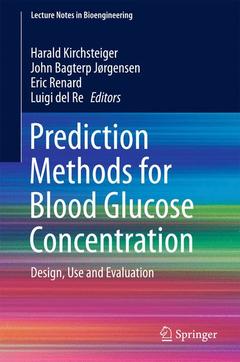Prediction Methods for Blood Glucose Concentration, Softcover reprint of the original 1st ed. 2016 Design, Use and Evaluation Lecture Notes in Bioengineering Series
Coordonnateurs : Kirchsteiger Harald, Jørgensen John Bagterp, Renard Eric, del Re Luigi

The authors address the topic of blood-glucose prediction from medical, scientific and technological points of view. Simulation studies are utilized for complementary analysis but the primary focus of this book is on real applications, using clinical data from diabetic subjects.
The text details the current state of the art by surveying prediction algorithms, and then moves beyond it with the most recent advances in data-based modeling of glucose metabolism. The topic of performance evaluation is discussed and the relationship of clinical and technological needs and goals examined with regard to their implications for medical devices employing prediction algorithms. Practical and theoretical questions associated with such devices and their solutions are highlighted.
This book shows researchers interested in biomedical device technology and control researchers working with predictive algorithms how incorporation of predictive algorithms into the next generation of portable glucose measurement can make treatment of diabetes safer and more efficient.
John Bagterp Jørgensen is an associate professor in Scientific Computing at Department of Applied Mathematics and Computer Science at the Technical University of Denmark. He is also a faculty member at the Technical University of Denmark’s Center for Energy Resources Engineering (CERE). His research focus is concentrated on Model Predictive Control including computational aspects and applications. The applications include industrial processes, intelligent control of smart energy systems, production optimization and closed-loop reservoir management of oil fields, and an artificial pancreas for people with type 1 diabetes. His research is to a large extent conducted in collaboration with industrial companies.
Eric Renard is professor of endocrinology, diabetes and metabolic diseases at the University of Montpellier I, France. He is also head of the Department of Endocrinology, Diabetes, Nutrition and the Clinical Investigation Center INSERM 1411 at Montpellier University Hospital. Since more than 20 years, his research group has been at the forefront of the transfer of technologies toward diabetes management, including wearable and implantable insulin pumps, continuous glucose monitoring and artificial pancreas models.
Luigi del Re is professor at the Johannes Kepler University in Linz, Austria, in the field of modeling and control of dynamical systems with special interest in complex nonlinear systems both from the control and the optimization point of view. He has been working in biomedical applications since 1992.
Explains how to use predictive algorithms to help control swings in blood glucose levels
Equips readers with practical information to assist them in designing more efficient devices for blood-glucose monitoring
Demonstrates the effectiveness of the methods discussed using real patient data
Includes supplementary material: sn.pub/extras
Date de parution : 11-2015
Ouvrage de 265 p.
15.5x23.5 cm



